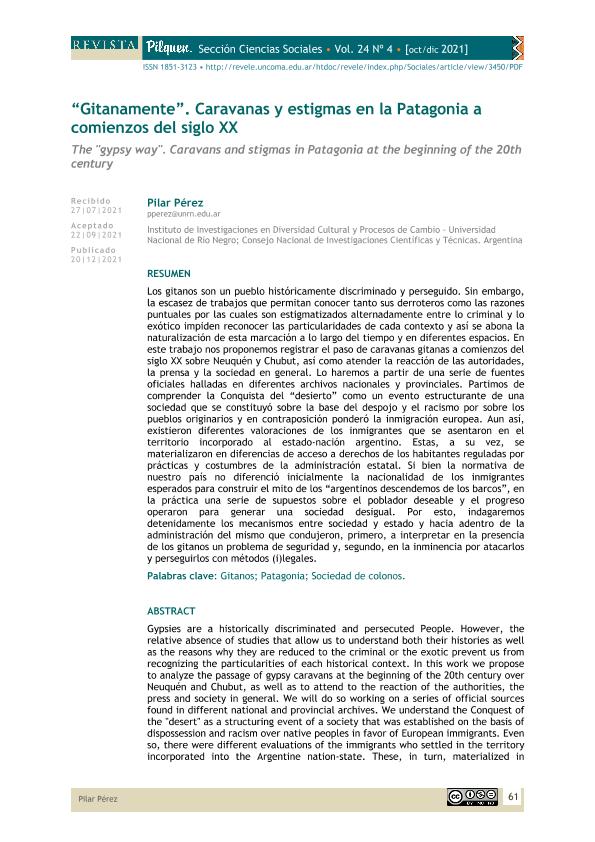Mostrar el registro sencillo del ítem
dc.contributor.author
Pérez, Pilar María Victoria

dc.date.available
2023-01-05T14:31:13Z
dc.date.issued
2021-12
dc.identifier.citation
Pérez, Pilar María Victoria; "Gitanamente": Caravanas y estigmas en la Patagonia a comienzos del siglo XX; Universidad Nacional del Comahue. Centro Universitario Regional Zona Atlántica; Pilquen: Sección Ciencias Sociales; 24; 4; 12-2021; 61-76
dc.identifier.issn
1666-0579
dc.identifier.uri
http://hdl.handle.net/11336/183523
dc.description.abstract
Los gitanos son un pueblo históricamente discriminado y perseguido. Sin embargo, la escasez de trabajos que permitan conocer tanto sus derroteros como las razones puntuales por las cuales son estigmatizados alternadamente entre lo criminal y lo exótico impiden reconocer las particularidades de cada contexto y así se abona la naturalización de esta marcación a lo largo del tiempo y en diferentes espacios. En este trabajo nos proponemos registrar el paso de caravanas gitanas a comienzos del siglo XX sobre Neuquén y Chubut, así como atender la reacción de las autoridades, la prensa y la sociedad en general. Lo haremos a partir de una serie de fuentes oficiales halladas en diferentes archivos nacionales y provinciales. Partimos de comprender la Conquista del “desierto” como un evento estructurante de una sociedad que se constituyó sobre la base del despojo y el racismo por sobre los pueblos originarios y en contraposición ponderó la inmigración europea. Aun así, existieron diferentes valoraciones de los inmigrantes que se asentaron en el territorio incorporado al estado-nación argentino. Estas, a su vez, se materializaron en diferencias de acceso a derechos de los habitantes reguladas por prácticas y costumbres de la administración estatal. Si bien la normativa de nuestro país no diferenció inicialmente la nacionalidad de los inmigrantes esperados para construir el mito de los “argentinos descendemos de los barcos”, en la práctica una serie de supuestos sobre el poblador deseable y el progreso operaron para generar una sociedad desigual. Por esto, indagaremos detenidamente los mecanismos entre sociedad y estado y hacia adentro de la administración del mismo que condujeron, primero, a interpretar en la presencia de los gitanos un problema de seguridad y, segundo, en la inminencia por atacarlos y perseguirlos con métodos (i)legales.
dc.description.abstract
Gypsies are a historically discriminated and persecuted People. However, the relative absence of studies that allow us to understand both their histories as well as the reasons why they are reduced to the criminal or the exotic prevent us from recognizing the particularities of each historical context. In this work we propose to analyze the passage of gypsy caravans at the beginning of the 20th century over Neuquén and Chubut, as well as to attend to the reaction of the authorities, the press and society in general. We will do so working on a series of official sources found in different national and provincial archives. We understand the Conquest of the "desert" as a structuring event of a society that was established on the basis of dispossession and racism over native peoples in favor of European immigrants. Even so, there were different evaluations of the immigrants who settled in the territory incorporated into the Argentine nation-state. These, in turn, materialized in differences in access to rights regulated by practices and customs of the state administration. Although the regulations of our country did not initially differentiate the nationality of the immigrants expected to build the myth of "Argentines descend from the ships", in practice a series of assumptions about the desirable settlers and progress operated to generate an unequal society. For this reason, we will carefully investigate the mechanisms between society and the state and within its administration that led, first, to interpreting a security problem in the presence of the gypsies and, second, in the imminence of attacking and persecuting them with (i)legal methods.
dc.format
application/pdf
dc.language.iso
spa
dc.publisher
Universidad Nacional del Comahue. Centro Universitario Regional Zona Atlántica
dc.rights
info:eu-repo/semantics/openAccess
dc.rights.uri
https://creativecommons.org/licenses/by-nc-nd/2.5/ar/
dc.subject
GITANOS
dc.subject
PATAGONIA
dc.subject
SOCIEDAD DE COLONOS
dc.subject.classification
Otras Historia y Arqueología

dc.subject.classification
Historia y Arqueología

dc.subject.classification
HUMANIDADES

dc.title
"Gitanamente": Caravanas y estigmas en la Patagonia a comienzos del siglo XX
dc.title
The "gypsy way": Caravans and stigmas in Patagonia at the beginning of the 20th century
dc.type
info:eu-repo/semantics/article
dc.type
info:ar-repo/semantics/artículo
dc.type
info:eu-repo/semantics/publishedVersion
dc.date.updated
2022-03-11T18:40:44Z
dc.identifier.eissn
1851-3123
dc.journal.volume
24
dc.journal.number
4
dc.journal.pagination
61-76
dc.journal.pais
Argentina

dc.journal.ciudad
Viedma
dc.description.fil
Fil: Pérez, Pilar María Victoria. Consejo Nacional de Investigaciones Científicas y Técnicas. Centro Científico Tecnológico Conicet - Patagonia Norte. Instituto de Investigaciones en Diversidad Cultural y Procesos de Cambio. Universidad Nacional de Río Negro. Instituto de Investigaciones en Diversidad Cultural y Procesos de Cambio; Argentina
dc.journal.title
Pilquen: Sección Ciencias Sociales
dc.relation.alternativeid
info:eu-repo/semantics/altIdentifier/url/https://revele.uncoma.edu.ar/index.php/Sociales/article/view/3450
Archivos asociados
